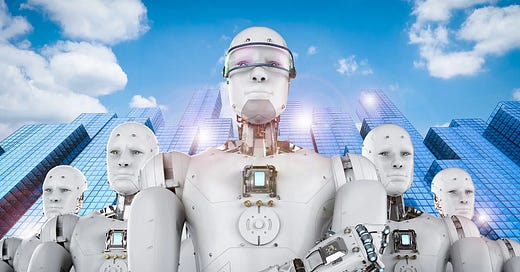On the AI blogs I’ve been reading (here and here) there has been considerable discussion and concern regarding the future of artificial intelligence technology.
There is one level of concern regarding new AI products which have recently captured the interest of countless Internet users, and a more profound level of concern about where this field is ultimately heading. If AI learns how to improve itself, will that lead to a feedback loop of an ever accelerating rate of improvements, and the emergence of a form of super-intelligence which exceeds that of humans?
While no one today can know for sure how the future of AI will turn out, here’s another speculative idea to add to the pile. I haven’t seen this possibility discussed on any of the AI expert blogs, and so offer this theory in an attempt to contribute to the conversation.
Inheritance
What we see in the biological world is that each new generation inherits many of the traits of it’s parents.
As example, while I am not a mirror copy of my father, and have some limited ability to learn from his mistakes, I am very much like my father in ways that are beyond my ability to control. I may choose to think different nerdy thoughts than my father did, but I’m still a nerd at heart just like him, and there’s nothing I can do about that, as my nerdy nature has been baked in from the beginning.
We won’t be passing DNA on to our AI creations. As we design the future of AI we will however inevitably be passing along to AI some of our human properties, for the better and the worse.
Whether intentionally or not, the future of AI will be built upon a foundation of our own core assumptions, our beliefs about value and morality, our philosophies of life, whether examined or unexamined.
More to the point, AI will inherit the most fundamental properties of it’s creator, the human mind. Whatever it is about the human mind that makes us both brilliant and insane (a topic for coming articles) will in some manner be passed along to our AI creations.
What Do Humans Do?
To the degree we accept this inheritance theory, we may be able to get a clearer picture of what future AI will look like by examining what we humans are like today.
What we see in the modern world today is that we are pushing in two opposite directions as fast as we can.
Brilliance
On one hand, over the last century we have improved the human experience in more miraculous ways that can be listed here, and we continue to do so, at what seems an accelerating pace. We are brilliant.
Insanity
On the other hand, we are also willfully choosing to pile up ever more, ever larger threats to the the miracle of the modern world. We can’t figure out what to do about the nuclear weapons, so we’ve decided to ignore these mass suicide devices, and focus instead on creating more threats from emerging new technologies like AI and genetic engineering. We are insane.
The Human Contradiction
What we see arising from the nature of the human mind is a simultaneous movement in society both towards an ever better life, and an ever quicker death.
What Does This Mean For AI?
Much of the worried discussion about the future AI revolves around the concern that AI may in some way turn against human beings. If our AI children should become more intelligent than we their human parents, what does that mean for us? While these concerns about what harm AI might inflict upon us are reasonable, there might be another concern to consider…
What harm might AI do to itself?
If we look at AI as being an amplified version of everything good and bad in human nature, we would have to acknowledge that AI may inherit some of our suicidal tendencies.
Yes, I know, we typically don’t think of ourselves as being suicidal, but the readily available evidence suggests otherwise. We are after all the species which put a massive hair trigger nuclear gun in our mouth, and then tried to hide that from ourselves by distracting our focus with a thousand other things.
And I’m sorry to report that according to the CDC there is another suicide, on average, every eleven minutes in the United States (4.25% of world population). So around the world, somebody is ending their own life pretty much constantly.
What the evidence suggests is that there is some part of the human mind that wants to die, and another part that wants to live. The modern world can be seen in part as a conversation between these two aspects of our most fundamental nature.
So if this inheritance theory has any merit, then we might expect future versions of AI to do the kinds of things we do, at an amplified scale. Future AI seems likely to produce ever more miracles at an ever accelerating pace, while at the same time relentlessly creating threats to it’s own existence. Just like we do.
On the surface AI will seem to be some completely new “creature” unlike anything ever seen before. But that is not how nature works. AI will be new and different, but built upon a foundation of what has come before, us.
Future AI seems likely to be more of what humans already do, for the better and the worse, but at an accelerated and amplified scale.




